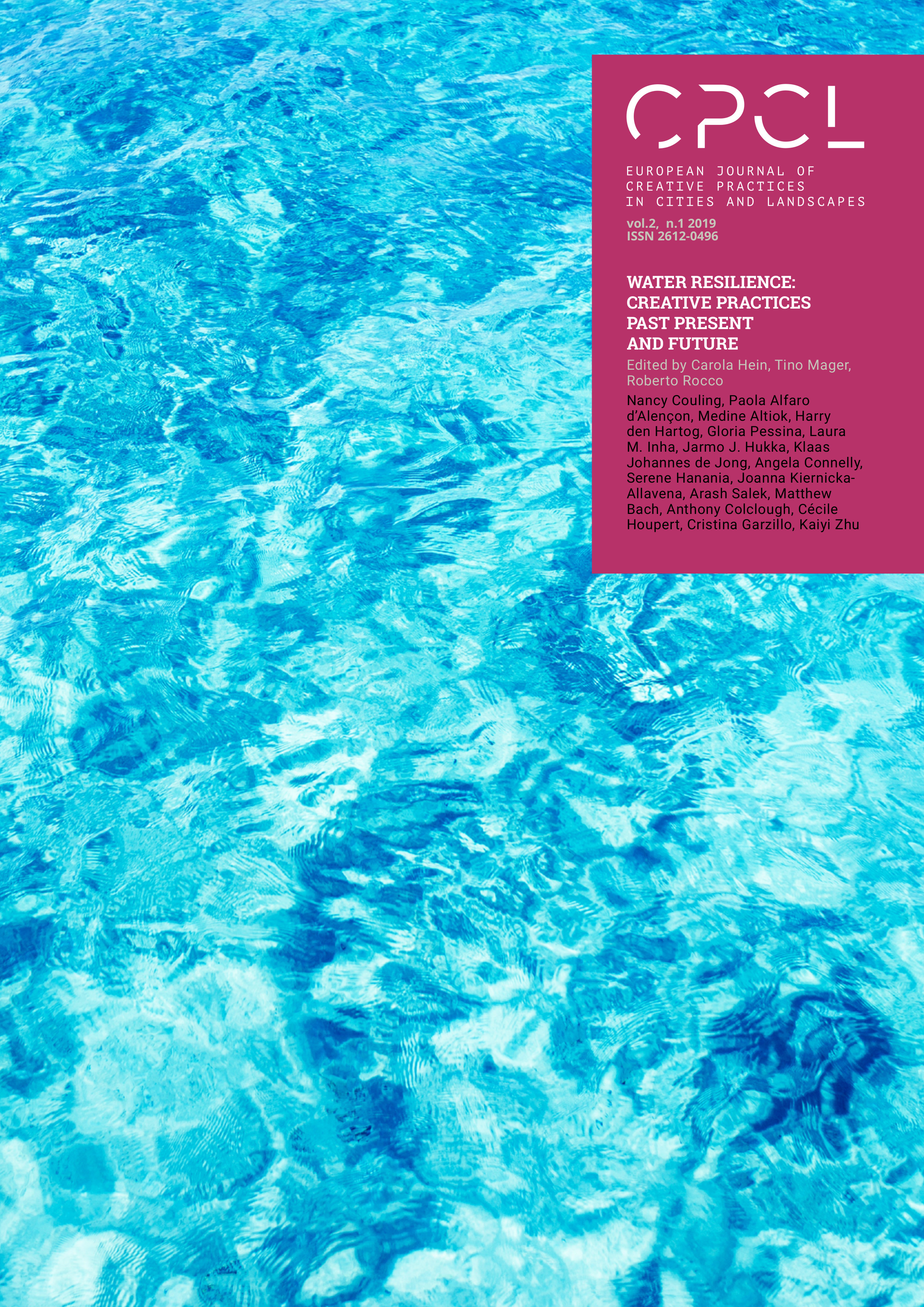Narrative Cartography: Capturing a Holistic Perspective on Waterscapes
DOI:
https://doi.org/10.6092/issn.2612-0496/8808Keywords:
waterscapes, narrative cartography, participation, citizen scienceAbstract
Water territories challenge inherited, land-based methods of capturing their history. They are a vital commons, where social, technical, political and cultural interests intertwine, potentially also causing conflict. Attention is currently focused both on the ecological importance of the water cycle for human well-being and ecosystem services, as well as on the unpredictable aspects of water through the effects of climate change. This paper argues that such interconnected challenges require new tools and methods of conceptualising and visualising waterscapes. Narrative cartography developed with citizen’s input, reveals itself to be a highly inclusive methodology which can capture neglected knowledge about the past as well as propose visions for the future. This method is discussed in two different geographic contexts through the academic projects Streamscapes in Germany and Mittelmeerland in the Mediterranean.
References
Altiok, Medine. “Poetic Sciences – Territory with a Liquid Border.” Covjek/Prostor - Man and Space, 680-681 (2011): 16-20
Brook, Richard and Nick Dunn. Urban maps: Instruments of narrative and interpretation in the city. Farnham: Ashgate, 2012.
Ballan, Mohamad. “Cartography, Maritime Expansion, and ‘Imperial Reality’: The Catalan Atlas of 1375 and the Aragonese-Catalan Thalassocracy in the Fourteenth Century.” Ballandalus, August 27, 2014. Accessed September 6, 2019. https://ballandalus.wordpress.com/2014/08/27/cartography-maritime-expansion-and-imperial-reality-the-catalan-atlas-of-1375-and-the-aragonese-catalan-thalassocracy-in-the-fourteenth-century/.
Dellenbaugh, Mary, Markus Kip, Majken Bieniok, Agnes Müller, and Martin Schwegmann. Urban Commons:Moving Beyond State and Market (Bauwelt Fundamente, Band 154). Basel: Birkhäuser, 2015.
Directive 2000/60/EC of the European Parliament and of the Council of 23 October 2000 establishing a framework for Community action in the field of water policy, Pub. L. No. 32000L0060, OJ L 327 (2000). http://data.europa.eu/eli/dir/2000/60/oj/eng.
Gee, Kira, Andreas Kannen, Robert Adlam, Cecilia Brooks, Mollie Chapman, Roland Cormier, Christian Fischer, et al. “Identifying Culturally Significant Areas for Marine Spatial Planning.” Ocean & Coastal Management 136 (February 1, 2017): 139–47. https://doi.org/10.1016/j.ocecoaman.2016.11.026.
Ghosn, Rania, El Hadi Jazairy, and Design Earth. Geostories: Another Architecture for the Environment. New York: Actar, 2018.
Görmar, Wilfried, and Bärbel Leupolt. “Übersicht Zu Raumstrukturellen Entwicklungen in Der Ostseeregion Aus Historischer Perspektive (Ergänzende Information).” Information Zur Raumentwicklung 8/9 (2009).
Herlo, Bianca, Florian Sametinger, Jennifer Schubert, and Andreas Unteidig. “Participatory Design and the Hybrid City. The Living Lab Mehringplatz, Berlin, and the Project 'Community Now? Conflicts, Interventions, New Publics'.” In Hybrid City 2015: Data to the People, Proceedings of the Third International Biennial Conference, Edited by Theona Iouliani and Dimitris Charitos. Athens: URIAC, 2015.
Hoyer, Jacqueline, Wolfgang Dickhaut, Lukas Kronawitter, and Björn Weber. Water sensitive urban design. Berlin: Jovis, 2011.
kollektiv orangotango+. This Is Not an Atlas. Bielefeld: transcript Verlag, 2018. Accessed February 27, 2019. https://notanatlas.org/book/.
Kravčík, Michal, Juraj Kohutiar, Martin Kováč, Jan Pokorný and Eugen Tóth. “Water for the Recovery of the Climate – A New Water Paradigm”, Slovakia, 2007. Accessed May 13, 2019. http://www.waterparadigm.org/download/Water_for_the_Recovery_of_the_Climate_A_New_Water_Paradigm.pdf.
LabGov – the LABoratory for the GOVernance of the City as a Commons. “The City as a Commons Papers: The Founding Literature and Inspiratinal Speeches.” In The Co-Cities Open Book. LabGov, 2019. Accessed May 13, 2019. http://labgov.city/co-city-protocol/the-co-cities-open-book/.
Magnaghi, Alberto. “Draft of the Territorialists’ Society Manifesto.” Translated by Marie-Anne Gillis, November 15, 2010. Accessed May 13, 2019. http://www.urbain-trop-urbain.fr/wp-content/uploads/2011/04/Alberto-Magnaghi_Draft-of-the-Territorialists-Society-Manifesto.pdf.
Ostrom, Elinor. Governing the Commons: The Evolution of Institutions for Collective Action. The Political Economy of Institutions and Decisions. Cambridge: Cambridge University Press, 1990.
Prominski, Martin, Antje Stokman, Daniel Stimberg, Hinnerk Voermanek, and Susanne Zeller. River.Space.Design. Berlin, Boston: De Gruyter, 2012. https://doi.org/10.1515/9783034611732.
Psarra, Sophia. Architecture and Narrative: The Formation of Space and Cultural Meaning. London: Routledge, 2009.
Riesch, Hauke and Clive Potter. “Citizen science as seen by scientists: Methodological, epistemological and ethical dimensions.” Public Understanding of Science, Vol 23, (2014): 107-120. https://doi.org/10.1177/0963662513497324.
Sanders, Elizabeth B. N., and Pieter Jan Stappers, “Probes, toolkits and prototypes: three approaches to making in codesigning.” CoDesign: International journal of cocreation in design and the arts 10, No. 1 (2014): 5-14. https://doi.org/10.1080/15710882.2014.888183.
Statistisches Bundesamt. “Gesamtwirtschaftliche Ergebnisse im Bundesländervergleich - Ausgabe 2018.” National statistics on economics. Statistisches Bundesamt Deutschland, 2018.
UNESCO. Marine Spatial Planning. Accessed July 25, 2019. http://msp.ioc-unesco.org/msp-guides/msp-guides-overview/.
Viganò, Paola. “The Horizontal Metropolis: A Radical Project.” In The Horizontal Metropolis Between Urbanism and Urbanization, edited by Paola Viganò, Chiara Cavalieri, Martina Marcelloni Corte. Berlin: Springer, 2018.
Visser, Sleeswijk, Pieter Jan van der Lugt, and Elizabeth B.-N. Sanders. “Contextmapping: Experiences from practice.” CoDesign: International Journal of CoCreation in Design and Arts 1, no. 2 (2005): 119-149.
Published
How to Cite
Issue
Section
License
Copyright (c) 2019 Nancy Couling, Paola Alfaro d’Alençon, Medine Altiok
Copyrights and publishing rights of all the texts on this journal belong to the respective authors without restrictions.This journal is licensed under a Creative Commons Attribution 4.0 International License (full legal code).
See also our Open Access Policy.





